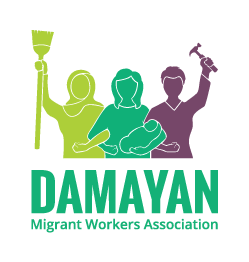2017 Workers Academy
DAMAYAN MIGRANTS | NOVEMBER 3, 2017
Damayan Workers Academy was off to a strong start with about 35 participants attending both Sunday and Monday sessions on October 8th and 9th. The academy is a four-part workshop series that aims to assist Damayan worker members with their new and ongoing cases, raise their consciousness, educate them about their rights, foster camaraderie among them, and draw courage from each other. The participants are mostly Filipino domestic workers (nannies, babysitters, caregivers, and housekeepers), other low-wage workers, and a few youth and students.
In Workshop 1, participants shared their personal stories of migration and learned common themes in their collective stories. They realized that most of them migrated due to poverty and massive unemployment back home, and the need to provide a better future for their families. They entered the US as tourists and low-wage workers, and eventually became domestic workers.
The facilitators then tied their stories to the Filipino people’s history of migration to the US and how Filipinos have historically mass migrated here to fulfill this country’s need for cheap labor. This started with the manongs in the early 1900s, the navy families in the 1940s, the professionals in the 1960s, and the domestic workers in the 1990s up to the present.
In Workshop 2, the participants learned about Damayan’s model of providing services and assisting workers’ cases while fusing it with organizing. They also discussed the flow of a case starting from an intake or interview up to completion of a case. Damayan handles cases such as labor trafficking, fraud in labor contracting, stolen wages, and domestic violence as well as adjustment of status.
In Workshop 3, the participants learned about labor trafficking and immigration reliefs such as T visa (for trafficking survivors), U visa (for victims of crime), VAWA (Violence Against Women Act) for domestic violence survivors, and more. Guest lawyers from Community Development Project at the Urban Justice Center presented.
In Workshop 4, the participants learned about their rights as immigrant workers in New York City. Labor lawyers from the Community Development Project at the Urban Justice Center and the Eisner & Dictor Associates discussed the rights of workers to the minimum wage, overtime pay, the 3 paid days off that domestic workers get if they work for a year for one for same employer and the 2 paid sick days that NYC is giving to low wage workers.
